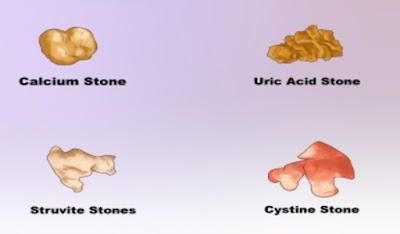Kinds of Kidney Stones
There are four major kinds of kidney stones, and their appearance is a unquestionable sign that body cannot discharge urine normally. Kidney stones are a tiny, hard accumulation of mineral and acid salts that grow and enlarge on the internal surface of kidneys. These stones get occurred when the urine becomes highly concentrated, letting a build-up of unrestrained salts and minerals.
Let us have a deep look at the detail of these stones:
 1. Uric acid stones
1. Uric acid stones
Uric acid stones start growing once the urine has undue or extra amounts of acid inside it. The intense volume of fish, shellfish and meat, mostly organ meat may raise the amount of uric acid in your urine. Hence, it is advisable to take the needful amount of these foods.
2. Calcium stones
Calcium stones are the most common types of kidney stones, and they have two main categories, calcium oxalate, and calcium phosphate. These crystals start forming overtime when the liver could not produce an excessive amount of oxalate and calcium; attain from spinach, wheat bran, nut-based products, rhubarb, and peanuts. In certain cases, a phosphorus build-up can also happen, which is acquired from compounds like disodium phosphate and foods, like meat, milk, and beans. With the formation of these compounds in kidneys, a stone in the shape of crystals starts to grow and with the passage of time these crystals become larger in size.
It’s doesn’t mean that due to fear of kidney stone formation; you have to eliminate the use of calcium in a daily routine diet. Calcium is harmless when consumed moderately. In fact, it gives aid in preventing the formation of kidney stones. Deficiency of calcium can also be a reason for the development of stones. It’s important to note that excessive use of calcium supplement can lead to a greater risk of developing kidney stones.
3. Struvite stones
This type of stones is usually developed due to urinary tract infection. In Urinary tract infection, urine contains bacteria, which causes production and concentration of ammonia and pH, ultimately leading to the development of struvite stones. Struvite stones build suddenly and have quick growth; early detection and diagnosis of bacteria can prevent the rapid growth of stone and minimize the complications.
4. Cystine stones
Cysteine stones are allied with a genetic disorder known as cystinuria. These are rare and occur when amino acid cysteine starts leaking from the kidneys and mix with urine, causes the development of cysteine stones.
Risk Factors of Kidney Stones
Here, take a look:
- Urinary Tract Infections
- Chronic Bowel Inflammation
- Obesity
- Diabetes
Common Signs of Kidney Stones
These include:
- sharp cramps of severe pain in
- Lower abdomen
- Groin region
- Under rib cage and back
- Frequent urination
- Fever
- Vomiting
- Feelings of pain or burning while urinating
- Chills
- feeling the need but unable or just little to urinate
- Seeing blood spotting in urine
- Nausea
These symptoms are can also be due to some other kind of disease like urinary tract infection; so it’s better to consult a specialist for rapid detection and early treatment.
Treatment of Kidney Stones
Kidney stones are treated in many ways of treatment and medications. It is better to consult the doctor for suitable treatment of particular kidney stone.
Some smaller stones can be omitted with extra intake of water and other fluids without any medication, sometimes antibiotics and aiding drugs are prescribed to treat infection and pain.
Larger stones cannot be treated with a simple procedure. The treatment of larger stones is performed in different kinds of treatment like lithotripsy, ureteroscope and a surgical operation. The doctor can decide the suitable procedure for the treatment of larger kidney stones.
Prevention
Kidneys stones formed due to concentration of urine and the excessive amount of calcium, so try to take a sufficient amount of fluids daily, particularly in hot weather and reduce the consumption of sodium in your diet. Cutting of sodium will reduce the calcium level in urine as well as reduce the risk of developing calcium kidney stones.


